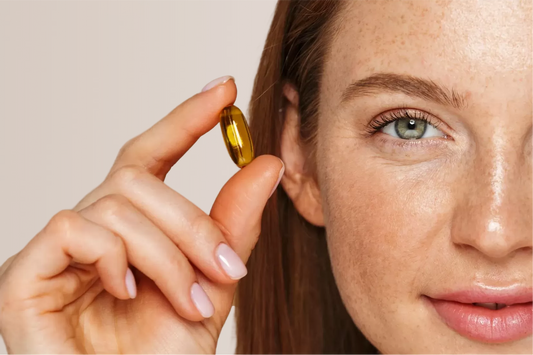How To Induce Autophagy Without Fasting
"How To Induce Autophagy Without Fasting" is a key concept for many, as most of us know that fasting triggers our body's ability to clean and renew its own cells, known as autophagy. However, the challenge is that fasting isn't so easy for everyone.
- Some of us have busy social and professional commitments that make it difficult to avoid eating.
- Others, like me, have hypothyroidism which means that our bodies think we are going into a sustained period of starvation when we begin to fast, and in their wisdom try to protect our ability to survive by down regulating our metabolism and making it difficult for bioavailable T3, one of our key thryoid hormones, from attaching to the receptors in our cells.
Understanding the Hormonal Impact of Fasting and the Need for Non-Fasting Autophagy Activation
At the same time, our bodies adrenal glands will increase cortisol production as a way to better regulate blood sugar, but this can lead to chronic inflammation and decreased production of melatonin. If that weren't bad enough, all that extra cortisol has to be made from another key hormone, progesterone, which helps us sleep, but also helps balance out our estrogen levels.
I think you can see why some of us would be highly motivated to find ways to trigger autophagy without having to fast!
What Is Autophagy?
Autophagy is a natural process in which our cells degrade and recycle components, removing damaged cells and generating new ones. This process is crucial for cellular health and longevity.
How To Induce Autophagy Without Fasting
how to activate autophagy without fasting? The Best Lifestyle Habits and Therapies That Induce Autophagy in the Brain- Intense Exercise: Incorporating resistance training and high-intensity workouts can stimulate autophagy.
- Prioritize Good Sleep: Quality sleep is essential for promoting autophagy, particularly in the brain.
- Heat and Cold Therapy: Regular exposure to heat (like saunas) and cold (like cold showers) can induce autophagy.
Autophagy Supplements & Foods
Have you heard of spermidine? Spermidine is a natural polyamine we produce in our gut biomes that, just like our body's autophagy process, reduces as we age. Thankfully, we can get it from spermidine-rich foods like Japanese fermented natto, tempeh, mature cheddar cheese, and spermidine supplements.
Spermidine has been proven to induce autophagy and acts as a calorie restriction mimetic, providing all the benefits of fasting without the pain. It also inhibits 9 of the 12 hallmarks of aging (the pathways through which your body ages and what is responsible for the signs and symptoms of aging).
Our premium, food-derived spermidine supplement, Primeadine, is made from food-derived concentrated wheat germ and offers a highly bioavailable way to up your spermidine intake. It's rigorously tested for purity and potency in Japan and the USA and some of the benefits of triggering autophagy and inhibiting the hallmarks of aging that you can expect include:
- Improved hair growth, quality and thickness (including lashes and eyebrows)
- Healthier nails and skin
- Better, deeper sleep
- Improved cognition and reduced brain fog
- Feeling more vibrant and vital
And of course, all of the benefits you can't see and feel but are happening as a result of kickstarting your cellular renewal process.
Learn more about our autophagy-inducing supplement, Primeadine.
Autophagy & The Keto Diet: Enhancing Cellular Health
The ketogenic diet is a powerful catalyst for autophagy, the body's natural process of cellular renewal and repair. Embracing a diet high in healthy fats and low in carbohydrates is not just a trend but a scientifically backed method to trigger autophagy. This approach aligns with our body's innate mechanisms, where ketones play a vital role in energy provision, especially for brain function. Interestingly, our natural state from birth aligns with this ketotic state, indicating its fundamental role in our physiology. Here's how the ketogenic diet and specific fats contribute to this beneficial process:
- Diet Composition: 75% of caloric intake from healthy fats and only 5-10% from carbs.
- Healthy Fats: Includes Extra Virgin Olive Oil (EVOO), grass-fed ghee, grass-fed butter, and Medium Chain Triglycerides (MCT's), particularly caprylic acid or C8.
- Ketones for Brain Energy: These fats provide ketones, fulfilling over 70% of the brain's energy needs.
- Natural Ketosis: We are inherently in a state of ketosis from birth, which continues during breastfeeding.
- Ketosis in Alzheimer's: Research shows that ketone receptors in Alzheimer’s patients’ brains remain functional, unlike glycogen receptors.
- Benefits of Olive Oil and Fish Oils: These oils are top choices for healthy fats, beneficial for overall health.
- Grass-fed Ghee: An excellent source of fat without lactose or casein proteins (A1 and A2), suitable for those with sensitivities.
- APOE4 Gene Consideration: Individuals with these genes should avoid saturated fats to reduce neurodegenerative risk, favoring olive oil and fish oil instead.
- KetoDiet Blog: A resource for recipes and information on ketogenic living (no affiliation, just friends).
Exercise-induced Autophagy
Intense physical activity is another effective trigger for autophagy without fasting. Incorporating resistance and high-intensity interval training into your regimen can stimulate this process. Innovations from Japan, like the Ka'atsu device or visiting their Ka'atsu YouTube channel (no affiliation) and the X3 Bar, have made exercise-induced autophagy more accessible and efficient. These methods offer a practical and time-efficient way to enhance autophagy, contributing to overall wellness.
Autophagy & Sleep
Quality sleep is critical for inducing autophagy. Disrupted sleep patterns can hinder this process, emphasizing the need for adequate rest. Ensuring a sleep-friendly environment and habits is crucial for maintaining the body's ability to self-renew and repair at a cellular level. This underscores the interconnected nature of lifestyle choices in promoting autophagy and overall health.
How Many Hours Into Fasting Before Autophagy Starts?
Autophagy typically begins several hours into fasting, often starting around 16-18 hours into the fast, according to some research. If you're wondering "How to Induce Autophagy Without Fasting" there are alternative methods such as engaging in regular exercise, following a ketogenic diet, or practicing calorie restriction, all of which can stimulate autophagy without the need for fasting.
How Long Do You Need to Stay in Autophagy?
How long to stay in autophagy? The length of time needed to stay in autophagy can vary depending on individual factors such as metabolism and dietary habits. Here are some general guidelines on how many hours for autophagy:
-
Short-term activation: Fasting for 12 to 16 hours can stimulate a moderate level of autophagy over a short period, which can contribute to routine cellular maintenance and overall health.
-
Moderate activation: Extended fasts of 24 to 48 hours are more likely to induce a longer-term moderate autophagic response, where the body begins relying on autophagy for energy and cellular repair.
- Significant activation: For a more sustained autophagic response, extended fasts exceeding 48 hours may be necessary, during which autophagy preserves cellular function and promotes the breakdown of damaged components.
What is the relationship between autophagy and disease?
The relationship between autophagy and disease is complex and multifaceted. Autophagy is a fundamental cellular process that eliminates damaged or dysfunctional cellular components, such as proteins, organelles, and other cellular structures, through lysosome-mediated degradation. This process is crucial for maintaining cellular homeostasis, differentiation, development, and survival. However, autophagy can also be impaired or dysregulated in various diseases, leading to detrimental consequences.
Autophagy plays a crucial role in preventing diseases, including neurodegenerative disorders and cancer, by eliminating damaged cells.
How Does Autophagy Affect Your Brain and Mental Health?
Autophagy plays a crucial role in maintaining brain health and mental well-being. Here are some key points on how autophagy affects the brain and mental health:
Autophagy and Brain Development
- Neurogenesis and Differentiation: Autophagy supports the development and maintenance of neural stem cells, promoting neural differentiation and maturation.
- Structural and Functional Remodeling: Autophagy helps in the structural and functional reorganization of neural cells during differentiation, ensuring proper neural function.
Autophagy and Neurodegeneration
- Neuroprotective Effects: Autophagy helps protect neurons from stress-induced damage and maintains cellular homeostasis, which is essential for preventing neurodegenerative diseases.
- Mitophagy and Mitochondrial Health: Autophagy, particularly mitophagy, helps maintain healthy mitochondria by removing damaged or dysfunctional mitochondria, which is critical for maintaining proper neural function.
Autophagy and Mental Health
- Stress Response: Autophagy helps the brain respond to stress by degrading damaged cellular components and maintaining cellular homeostasis, which is essential for maintaining mental well-being.
- Neuroplasticity and Adaptation: Autophagy facilitates neural adaptation and plasticity by promoting the degradation of unnecessary proteins and organelles, allowing for the formation of new neural connections and the reorganization of existing ones.
Implications for Mental Health
- Autophagy Deficiency: Deficiencies in autophagy have been linked to various neurological and psychiatric disorders, including neurodegenerative diseases, autism spectrum disorder, and depression.
- Therapeutic Potential: Modulating autophagy through dietary interventions, exercise, or pharmacological agents has been proposed as a therapeutic strategy for treating neurodegenerative diseases and mental health disorders.
Improving Mitochondrial Health
Improving mitochondrial health involves several strategies that enhance the removal of damaged mitochondria through autophagy, ensuring optimal energy production and cellular vitality. Here are some key points:
Diet and Nutrition
- Eat a diet rich in healthy fats like omega-3s from fish, olive oil, nuts, and seeds. Mitochondria need healthy fats to create energy efficiently.
- Consume antioxidant-rich foods like fruits and vegetables to reduce oxidative stress that can damage mitochondria.
- Certain nutrients like coenzyme Q10, alpha-lipoic acid, and acetyl-L-carnitine are essential for mitochondrial function. Foods rich in these include organ meats, fatty fish, nuts, and seeds.
Exercise
- Regular exercise, particularly high-intensity interval training, has been shown to improve mitochondrial function by increasing mitochondrial biogenesis and reducing oxidative stress.
- Exercise helps build muscle, which in turn increases the number and size of mitochondria that support them.
Sleep
- Adequate sleep is essential for mitochondrial repair and regeneration. Sleep deprivation can lead to oxidative stress and mitochondrial dysfunction.
Stress Management
- Chronic stress contributes to oxidative stress and mitochondrial dysfunction. Stress management techniques like meditation and yoga can help reduce oxidative stress and improve mitochondrial function.
Temperature Manipulation
- Heat therapy like saunas can increase temperature and stimulate mitochondrial growth and strength.
- Cold therapy, when combined with exercise, can directly increase mitochondrial biogenesis and indirectly benefit mitochondria by reducing oxidative stress.
Gene Intervention
- Gene modifications can enhance mitochondrial dynamics, which is crucial for maintaining the quality and functionality of mitochondria.
Eliminating Viral Infected Cells
Autophagy plays a crucial role in eliminating viral infected cells, which is essential for immune defense. Here are some key points:
Autophagy in Viral Infection
- Host Autophagy: Host autophagy is activated during viral infection to degrade invading viruses and facilitate the presentation of viral antigens to the immune system.
- Viral Manipulation: Viruses have evolved strategies to hijack and subvert host autophagy for their own benefits, such as evading degradation and immune responses.
- Selective Autophagy: Selective autophagy targets specific cellular components, such as viruses, for degradation. This process helps in eliminating infected cells and preventing viral replication.
- Antiviral Interferon Response: Autophagy collaborates with the antiviral interferon response to inhibit viral replication and promote cell survival.
- Cell Survival: Autophagy helps in maintaining cell survival by degrading and preventing the accumulation of damaged cellular components, such as viral capsids.
Autophagy in Immune Defense
- Pathogen Clearance: Autophagy helps in clearing pathogens from infected cells, which is essential for immune defense.
- Antigen Presentation: Autophagy facilitates the presentation of viral antigens to the immune system, which is crucial for the initiation of an adaptive immune response.
- Inflammation Regulation: Autophagy regulates inflammation by degrading and preventing the accumulation of pro-inflammatory mediators.
Reduces Cellular Apoptosis
By removing damaged cells, autophagy reduces unnecessary cellular apoptosis (cell death), maintaining a healthy cell population.
Autophagy Creates a Stronger and More Stress Resilient Body and Mind
Autophagy plays a crucial role in creating a stronger and more stress resilient body and mind by removing damaged organelles and recycling their components. This process helps maintain cellular homeostasis and ensures optimal cellular function under stressful conditions. Here are some key points:
Autophagy and Stress Resilience
- Autophagy and Stress Response: Autophagy is activated during stress to maintain cellular homeostasis and ensure optimal cellular function under stressful conditions.
- Autophagy and Cellular Homeostasis: Autophagy helps maintain cellular homeostasis by removing damaged organelles and recycling their components, which is essential for cellular survival and function.
- Autophagy and Stress Memory: Autophagy helps regulate stress memory by degrading and recycling excessive stress-related molecules, which can enhance stress resilience and improve the capacity to cope with upcoming stress.
- Autophagy and Cell Death: Autophagy can also induce cell death in cells that are no longer functional or damaged beyond repair, which helps maintain cellular homeostasis and prevent the accumulation of damaged cells.
Autophagy and Neuroprotection
- Autophagy and Neurodegeneration: Autophagy plays a crucial role in neurodegeneration by removing damaged organelles and recycling their components, which helps maintain protein homeostasis and prevent neurodegeneration.
- Autophagy and ER Stress: Autophagy is activated during endoplasmic reticulum (ER) stress to maintain protein homeostasis and ensure optimal cellular function under stressful conditions.
Caloric Restriction & Protein Restriction
Caloric and protein restriction, even without full fasting, can trigger autophagy, providing an alternative to traditional fasting methods. Here are some key points:
Caloric Restriction
- Autophagy Induction: Caloric restriction induces autophagy by reducing insulin and IGF levels, which decreases mTOR signaling and promotes autophagy.
- Autophagy Flux: Caloric restriction increases autophagy flux, which helps maintain cellular homeostasis and promotes cellular survival under stressful conditions.
- Cellular Protection: Caloric restriction protects cells from damage by removing damaged organelles and recycling their components, which helps maintain cellular integrity.
Protein Restriction
- Autophagy Induction: Protein restriction also induces autophagy by reducing protein synthesis and promoting the degradation of damaged proteins.
- Autophagy Flux: Protein restriction increases autophagy flux, which helps maintain cellular homeostasis and promotes cellular survival under stressful conditions.
- Cellular Protection: Protein restriction protects cells from damage by removing damaged proteins and recycling their components, which helps maintain cellular integrity.
Alternative to Fasting
- Less Invasive: Caloric and protein restriction are less invasive than traditional fasting methods, making them a more accessible alternative for inducing autophagy.
- Easier to Implement: Caloric and protein restriction are easier to implement and maintain than traditional fasting methods, which can be challenging for some individuals.
- Similar Benefits: Caloric and protein restriction provide similar benefits to traditional fasting methods, including the induction of autophagy and the promotion of cellular survival under stressful conditions
Foods that promote autophagy
Foods that promote autophagy include:
- Green Leafy Vegetables: Spinach, kale, broccoli, and other leafy greens are rich in nutrients and contain compounds that support autophagy.
- Berries: Berries like blueberries, strawberries, and raspberries are packed with antioxidants and phytochemicals that promote autophagy.
- Cruciferous Vegetables: Vegetables like cauliflower, cabbage, and Brussels sprouts contain sulforaphane, a compound known for its potential to induce autophagy.
- Turmeric: Turmeric contains curcumin, a polyphenol with antioxidant and anti-inflammatory properties that supports autophagy.
- Green Tea: Green tea is rich in polyphenols and contains epigallocatechin gallate (EGCG), which is effective in inducing autophagy.
- Extra Virgin Olive Oil: Extra virgin olive oil contains polyphenols that induce autophagy and improve cellular function.
- Fatty Fish: Fatty fish like salmon, mackerel, and sardines are excellent sources of omega-3 fatty acids that support autophagy.
- Nuts and Seeds: Nuts like almonds, walnuts, and Brazil nuts, as well as seeds like flax seeds and chia seeds, provide healthy fats, fiber, and antioxidants that promote autophagy.
- Dark Chocolate: Dark chocolate contains flavonoids that support autophagy and have other health benefits.
- Coffee: Coffee contains polyphenols and other bioactive compounds that induce autophagy when consumed in moderation.
- Medicinal Mushrooms: Medicinal mushrooms like Reishi and Chaga contain beta-glucans that induce autophagy and have anti-cancer properties.
- Falcarindiol: Falcarindiol, a compound found in carrots, contributes to autophagy.
- Punicalagin: Punicalagin, a compound found in pomegranates, promotes autophagy.
- Silibinin: Silibinin, a natural flavonoid found in milk thistle, increases autophagy via mitochondria and reactive oxygen species signaling.
- 6-Shogaol: 6-Shogaol, a compound found in ginger, inhibits the AKT/mTOR pathway and induces autophagy.
- Resveratrol: Resveratrol, found in dark grapes, berries, cherries, and red wine, inhibits breast cancer stem-like cells and induces autophagy.
- Tocotrienols: Tocotrienols, a type of vitamin E, induce apoptosis and autophagy in rat pancreatic stellate cells through the mitochondrial death pathway.
- Curcumin: Curcumin, a polyphenol found in turmeric, activates AMPK and induces autophagy.
- Piperine: Piperine, a compound found in black pepper, induces autophagy and boosts the bioavailability of curcumin.
What is the process of autophagy?
Autophagy is induced when the cell is put under stress or there is depletion of growth factors and/or nutrients in the media where the cell resides. Adverse environmental conditions, such as starvation, growth factor deprivation, and pathogen infection, can trigger autophagy.
Initiation
The process of autophagy begins with the formation of a double-membrane structure called the phagophore or isolation membrane. This membrane originates from various sources, such as the endoplasmic reticulum, Golgi apparatus, or plasma membrane.
Elongation and Maturation
The phagophore elongates and engulfs a portion of the cytoplasm, including damaged organelles, misfolded proteins, or invading pathogens. As the phagophore expands, it forms a closed double-membrane vesicle called an autophagosome.
Fusion and Degradation
The autophagosome fuses with a lysosome, forming an autolysosome. Lysosomal hydrolases then degrade the contents of the autophagosome, including the engulfed cellular components. The degraded materials are released into the cytoplasm and can be reused as building blocks for new cellular components or as a source of energy.
Recycling
The degraded materials released from the autolysosome are recycled and used as building blocks for new cellular components or as a source of energy, allowing the cell to maintain homeostasis and function efficiently.Autophagy is a highly regulated process controlled by various signaling pathways, such as the mTOR pathway. Defects in autophagy have been linked to various diseases, including cancer, neurodegenerative disorders, and autoimmune diseases.
What is autophagy in fasting?
In fasting, autophagy is accelerated as the body turns to internal sources of energy, leading to increased cellular cleaning and renewal.
Is autophagy good or bad?
Autophagy is a natural process that can have both beneficial and adverse effects. While it is generally considered beneficial, excessive autophagy can have negative consequences. It is essential to maintain a balance between autophagy and other cellular processes to ensure optimal cellular function and health.
How to Lower and Cut Your Risk of Cancer
Engaging in habits that induce autophagy, such as healthy eating, exercise, and proper sleep, can lower the risk of cancer by removing damaged cells. Here are some ways to induce autophagy and reduce the risk of cancer:
Healthy Eating
- Fasting: Fasting can induce autophagy by reducing insulin and IGF levels, which decreases mTOR signaling and promotes autophagy.
- Nutrient-Rich Foods: Consuming nutrient-rich foods, such as fruits, vegetables, whole grains, and lean proteins, can help maintain cellular homeostasis and promote autophagy.
- Antioxidants: Including antioxidants in your diet, such as polyphenols and flavonoids, can help reduce oxidative stress and promote autophagy.
Exercise
- High-Intensity Interval Training (HIIT): HIIT can induce autophagy by increasing the production of autophagy-related proteins and reducing mTOR signaling.
- Resistance Training: Resistance training can also induce autophagy by increasing the production of autophagy-related proteins and reducing mTOR signaling.
Proper Sleep
- Sleep Quality: Maintaining proper sleep quality is essential for autophagy, as sleep deprivation can reduce autophagy and increase the risk of cancer.
Additional Tips
- Reduce Stress: Reducing stress through techniques like meditation and yoga can help promote autophagy and reduce the risk of cancer.
- Avoid Toxins: Avoiding exposure to toxins, such as pesticides and heavy metals, can help reduce the risk of cancer by promoting autophagy and reducing oxidative stress.
How Do You Trigger Autophagy?
Autophagy can be triggered through various methods including intense exercise, a ketogenic diet, and specific supplements.
Conclusion
Grasping "How To Induce Autophagy Without Fasting" is pivotal for enhancing your health and longevity. Autophagy, a key biological process, can be effectively stimulated through various methods beyond fasting, offering a range of options to maintain and improve your well-being.
FAQ
- Do I Need to Fast for Autophagy?
- No, there are several ways to induce autophagy without fasting.
- How Many Hours Into Fasting Before Autophagy Starts?
- Autophagy typically starts around 16-18 hours into a fast.
- What Is the Best Way to Induce Autophagy Without Fasting?
- Intense exercise, a healthy diet, good sleep, and certain supplements like spermidine are effective.



